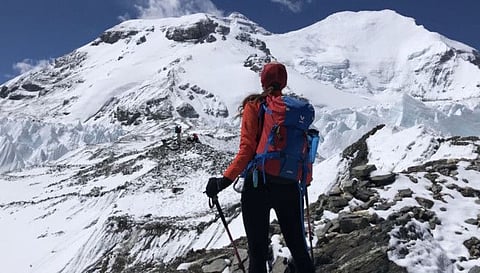Dubai-based Dolores Al Shelleh hopes to inspire others with Everest climb
Became the first Arab female to scale world's highest mountain from the northeast ridge

Abu Dhabi: At the age of 26, Dolores Al Shelleh scaled her first mountain. And right then, she decided she wanted to climb the world’s highest mountain before she turned 30.
“It was a goal I set for myself after I had climbed the 6476-metre Mera Peak in the Himalayas, and I wanted to achieve it so that other women everywhere could be inspired,” the now-29-year-old told Gulf News.
Al Shelleh reached the Everest summit on May 23, 2019, becoming the first Arab woman to scale the mountain from its more treacherous northeastern ridge. She also filmed her entire journey in a story that will premiere on the National Geographic Abu Dhabi on Sunday March 8, which is International Women’s Day 2020.
Never too late to dream
“It was a journey that I started late, and I want people who watch it to understand that it is never too late to be pursuing one’s dreams,” Al Shelleh said ahead of a talk in the capital last week.
There are no other mountaineers in Al Shelleh’s family, who hail from Jordan and Serbia. So her passion for the activity surprised her parents when she initially embarked upon it.
“Eventually, I remember my mom told me that they would not stop me from achieving what I wanted for myself,” Al Shelleh said.
Training and preparation
To train, Al Shelleh had to maintain her physical fitness, and she had to continue climbing regularly. Along the way, she scaled Mount Kilimanjaro, Africa’s highest mountain, and Elbrus, the highest peak in Europe.
“Despite this, Everest is a completely different bargain. The entire process takes a long time – about two months. And no matter how many peaks you’ve reached, getting to the top of Everest – the top of the world – is a special feeling,” she said.
Al Shelleh worked out for up to three hours daily. She also had to practise sleeping in a high-altitude tent. For about two months before embarking on her journey, she slept in a tent on her bed that mirrored a high-altitude, low-oxygen environment within it.
But it wasn’t just the physical preparations that were daunting. The 8,848-metre Everest climb required financial outlays of about $65,000 (Dh238,000) and Al Shelleh had to find sponsors for it. Fortunately, her employers in Dubai’s Sustainable City were happy to support her passion, even allowing her to take days off to train and prepare for the journey.
The climb
Al Shelleh had set off last April with a 20-member expedition to climb Everest. In addition to the challenges of harsh and unpredictable weather during a climb, eating and nutrition present their own difficulties for a climber.
“One cannot eat too much protein since it won’t be digested easily. And you have to eat what you are presented with, which is never the quality one is used to back home. You also have to drink three to four litres of water a day to preserve your strength,” Al Shelleh said.
As a climber makes gains on altitude, it feels as if one’s body is dying.
“You feel dizzy, and in the low-oxygen environment, movement is difficult. I found myself often craving a good, hot meal,” Al Shelleh said.
Tougher route
By opting for the northeastern ridge, the 29-year-old had also chosen the arguably harder route to the top. Compared to the southern side, the North Face has more unpredictable weather, including high winds. Al Shelleh said it is also supposed to be rockier, and there is more distance between it and the summit.
Even after her moment to celebrate had arrived, there were other challenges.
“Coming down was more difficult than I expected. And I was so exhausted that I suffered from hypothermia,” Al Shelleh said.
Looking ahead
The Arab explorer now hopes to push other women with her journey, which will be aired as ‘The Lone She’ film on National Geographic Abu Dhabi.
“Many people have asked me why I was doing this in my 20s when I should have been enjoying life. The truth is it is my passion, and [age and gender are no barrier],” Al Shelleh said.
While she hasn’t exactly decided when and if she wants to conquer all seven highest summits, Al Shelleh knows she does not intend to stop mountaineering.
“I’ve climbed three of the highest already, as well as Mount Manaslu, known as the fourth most difficult mountain above 8,000 metres to climb. So I will keep at it,” Al Shelleh said.
Everest facts
8,848 metres tall 2019: 876 people summited the mountain; 11 people died during the climb Till date: 10,050 summits; 291 deaths
Sign up for the Daily Briefing
Get the latest news and updates straight to your inbox



